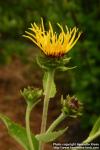You'll find a list of all my blog posts in the blog archive.
Herb of the week: Elecampane.
Latin: Inula helenium.
Family: daisy family, Asteraceae.
Parts used: Root.
Taste: Aromatic, bitter, tingly.
4 humors: Warm, dry.
Actions:
- expectorant (= makes you cough)
- digestive (= helps the digestion)
- diaphoretic, diuretic (= makes you sweat, makes you pee)
- emmenagogue (= helps slow menses get started)
Notes:
- The root of a five year old plant will be head-sized. It'll still be easy to slice through.
- If you only have the one plant, pull up a few of the long straight finger-thick side roots instead. You'll get plenty of root that way, too.
- For years I wondered why the herb books said "mildly bitter". This isn't anywhere near "mildly". Until one year I dug the root in fall ... it's so loaded with inulin that it's almost sweet, and, yes, mildly bitter.
- The taste is cool: first it's aromatic and you wonder why this herb isn't used more than it is. About half a minute later, the bitterness hits. Whoa ... and about half a minute after that, you notice that your sense of taste is gone. No worries, you'll be able to taste things normally in half an hour or so.
- Christopher Hedley uses elecampane for chronic fatigue like this:
"Chronic Fatique Syndrome usually responds, slowly, to continued use of Restorative Herbs backed up by short bursts of Immune System stimulants, plus lots of loving attention."
"My favorite restorative mix is a decoction of Elecampane (Inula helenium), Lovage (Levisticum off.), Cinnamon bark or twigs and Liquorice, ratio 2:2:1:1. A few Cardamoms may be added, to help restore brain power. Take 3 or 4 cups a day."
"For Immune system stimulants try Echinacea (E. purpurea is best - and is easier to grow), Ginseng spp. and the fungus Ganoderma lucidum with a little black pepper. These can usually be taken as tinctures. Try 15 drops every 4 hours, 4 days on and 4 days off. Change them from time to time."
Experiences:
- It's excellent for coughs which have a digestive element. Coughs where the problem stems not from the lung, but perhaps from a low low low immune system due to a very underactive digestion. (You need to ingest and to be able to digest proteins in order to make white cells.)
- Great for digestive problems as well.
- Give it a shot in asthma and longer-term phlegmy respiratory tract problems. Like, for instance, that thick slime at the back of the throat that'll make you hem and haw all the time.
- (I usually give it either as a syrup or in tea blends.)
- A tea of the root, drunk hot, will make you sweat.
- It's been used for night sweats, but I'd ask: why the night sweats?
Comments on Facebook:
http://www.facebook.com/notes/henriettes-herbal/herb-of-the-week-elecampane/459721204039316
- From Marika C:
Henriette, you are amazing! You have just answered a question that I have been struggling to find the answer to. Thank you!
20 June at 11:19 - From Henriette's herbal:
Marika: you've made me curious: what was the question? :-)
20 June at 13:27 - From Marika C:
That after a long period of illness with a lung issue the problem is now linked to digestion. The digestive imbalance is influencing lung issues at certain times but not always. This is more apparent when protein is lacking or is reduced in the diet. Hope that makes sense, it has been baffling me.
20 June at 14:10 - From Henriette's herbal:
yep, makes sense. Digestion. Protein. Immune system. Respiratory flareups ...
20 June at 15:16 - From Nathalie C:
one of my favourites, make a great syrup as a base for cough/digestive mixes. Always always use in recovery from respiratory tract infections. I think it has antimicrobial properties for lung & gut. David Winston told me he thinks it works on encapsulated parasites but not had the opportunity to test it yet (fortunately?!)
20 June at 13:03 - From Henriette's herbal:
Oooh. Interesting. I'll give it a shot for that when next I see a client with the problem. Thanks!
20 June at 13:26 - From Ciara O'M:
Some interesting work done in Cork University showed it had activity in vitro against MRSA...
20 June at 14:38 - From Henriette's herbal:
Oh yes, use it for that both externally and internally.
20 June at 15:17 - From Patricia Kyritsi Howell:
One of my favorites...here is Henriette Kress' take on this reliable lung tonic.
20 June 2012 at 20:13 - From Jane A:
This is the one herb that I am really allergic to.....throat swells--the whole thing. Interesting.
21 June 2012 at 00:19 - From Valorie J:
Inula is in my top 5. I am truly grateful for this plant.
20 June at 21:14 - From Beth N Tim W:
Love this root. Got me over the worst respiratory virus/infections I've ever had. I agree I am grateful to this plant.
20 June at 22:27 - From Jess P:
Best lung tonic! Love!
20 June at 22:49
Comments on the herblist:
http://lists.ibiblio.org/mailman/listinfo/herb
From Annette W.:
Date: 2012 06 20 - 18:40:02 +0300"Christopher Hedley uses elecampane for chronic fatigue:"
yes he used to say the old name for it was elf wort and it was a remedy for elf shot - a disease of sudden fatigue caused by energy seeping out of the body through the holes caused by being shot by elves arrows!
I've always used it like that ever since -who could resist such an image!
It'll be in my new book, "Practical Herbs 2", due out this fall.
Please add your own experiences etc. in the comments.



Add new comment